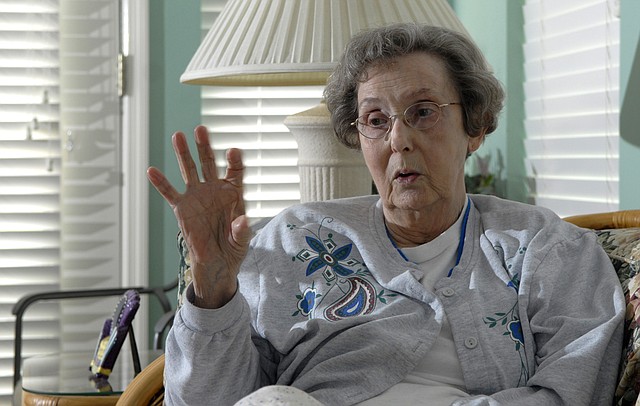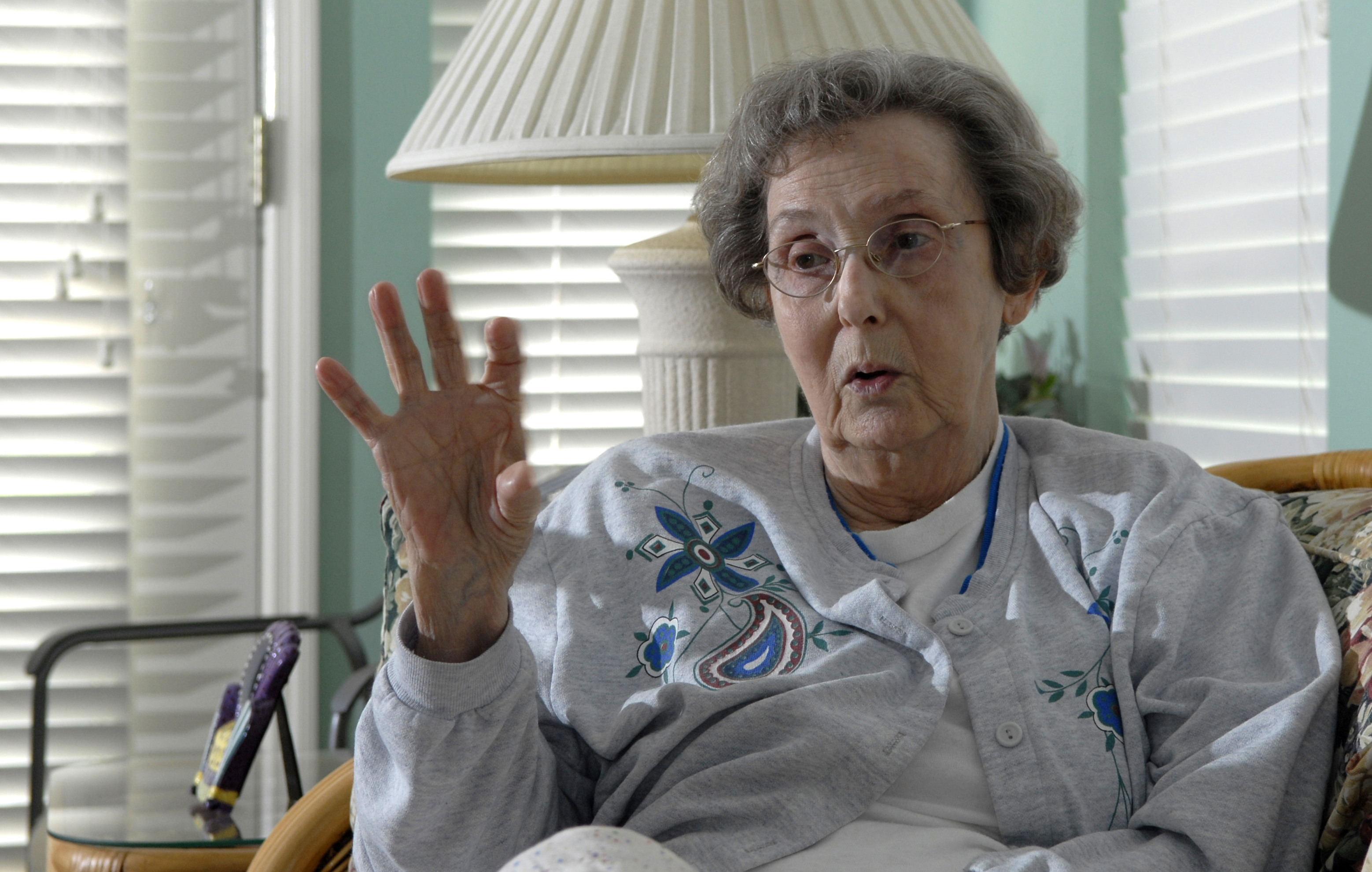Experts say storm survivors can feel stress for years
Monday, May 9, 2011
When Joyce Vaughn woke in the dead of night on March 27, 1997, a noise was the first indication something was wrong.
Vaughn, then 67, roused from a deep sleep just after 1 a.m. to what she thought was hail "as large as tennis balls" hitting the roof of her house in East Brainerd. Still groggy from medication she was taking for an upcoming spinal fusion, she sought her husband, Wes, who had moved into the dining room.
That's when the tornado hit.
"As soon as he stepped away from the window, the windows imploded on him," Ms. Vaughn said. "Then, he went in the dining room, and it did the same thing."
The Vaughn family took shelter in an alcove near their bedroom as the roof was ripped off. The house was completely destroyed.
The so-called Good Friday tornado was the most-destructive to hit Chattanooga before the waves of storms that hit the city April 27 and killed 329 people across the Southeast, according to the Associated Press.
Although Vaughn rebuilt her home, she said she still feels traumatized by the experience.
"It just scares me to death, even now," she said. "I have trouble sleeping because if the least bit of light comes in the bedroom, I'm awake."
Events that remind sufferers of traumatic occurrences can trigger such reactions, said Tim Sisemore, a clinical psychologist at the CBI Counseling Center in Chattanooga. Like Vaughn, victims of the tornado may now find stormy weather more stressful than before, Sisemore said.
According to the U.S. Department of Veterans Affairs National Center for Post Traumatic Stress Disorder, 6 percent to 33 percent of survivors show signs of acute stress disorder following a trauma. Rates are higher for victims of violence, lower for victims of accidents or natural disasters, such as tornadoes. ASD, which occurs in the first month following a trauma, differs from PTSD, which can only be diagnosed after symptoms have persisted for more than a month.
And while the risk of one leading to another is high - according to the National Center for PTSD, 80 percent of ASD sufferers are found to have PTSD in six months - experts say healing is very much within reach.
Simply being aware of abnormalities is essential, said Susan Jackson, a local Red Cross Disaster Service Health Resources nurse manager.
Look for "anything that deviates from their norm," she said. "If [someone starts behaving with marked difference], the family knows that's not normal and they know they need help. Your family is going to have to be your barometer."
Early symptoms of ASD, said Sisemore, can include difficulty concentrating, fear, nightmares, increased awareness of loud noises, sleep problems, irritability and headaches. PTSD can cause those symptoms to be exacerbated and can also include flashbacks down the road.
Not all people have the same symptoms, Jackson said. And a person in trouble is not always going to articulate the need for help.
"You're watching their body language, and something may trigger something in your psyche that says 'this person is under a tremendous amount of stress.' ... Every person reacts differently. Some people withdraw, and some people go bonkers."
Diagnosing a stress disorder can be difficult, said Sisemore.
"Sometimes the diagnostic manual will use the fuzzy term 'significantly interfering with functioning.' I think that translates to 'Can I focus on my job? Can I take care of my family? Can I keep up with the routine?'"
If the symptoms worsen after about a week, it's time to seek help, experts say. And Sisemore said one must learn to face up to fears.
"One of the worst things is avoidant behaviors," he said. " 'I'm not going there, I'm going to stay away from this place,' that can make it worse and help lead into PTSD over time.
After her Clayton Drive home was destroyed by the 1997 tornado, Marie Stephenson turned to her faith to help her reset. She recalls waking up in her living room and noticing lightning flashing continuously through her window.
Looking out, she saw a "sand-colored funnel" sitting silently above her in-ground swimming pool. Within seconds, the tornado "just walked in," she said.
"It was scary. I didn't know it was a tornado," Stephenson, 77, said. "People say it sounds like a train, but I heard nothing."
A falling beam temporarily knocked Stephenson unconscious. When she recovered, she was found by a neighbor, who evacuated her to his home. She spent two days in the hospital.
"It was quite an experience, I'd say," she said. "You don't ever want to be in one that close."
Despite catastrophic damage to much of her home, Stephenson said, the storm left some areas untouched, including the bedroom, where she had stored the money entrusted to her as treasurer of her church choir. Every penny was still there.
Although she continues to be apprehensive about approaching storms, Stephenson said she turns to her faith for solace.
"When they predict severe thunderstorms, naturally, it hits me, and I think about it, but everything is going to be fine," she said. "I don't dwell on it, not to the point that I can't go on.
"It's just something tragic that happened, and I'm sad that I lost things that can't be replaced, but there's no point in dwelling. That upsets the whole nature of having your faith. You have to turn to your faith and trust."
The National Center for PTSD also recommends turning to a mental health professional, a family doctor or a close friend or family member to help begin the healing process.
Sisemore described initial stress reaction as being like a bell curve. After the initial survival mode wears off, anxiety can set in and may get worse, briefly, but then should start to dissipate. "If it continues to accelerate," he said, "if it's not settling down in a normal way, then you're starting on a trajectory where this is not recovering."
During last week's Chattanooga-area storms, Stephenson lost only a single Leyland cypress from her yard, but she said she understands, firsthand, the shock and fear of those who were less fortunate.
"I'm very thankful, and I can really sympathize with these other people who have lost loved ones and homes," she said. "I know; I've been there. I've experienced losing a home."
At the Red Cross, Jackson said, they've tried to work with victims of the April storms to set them on a course to healing, both mentally and physically. Indeed, stress can take a physiological toll.
Recently, she said, one client presented with dizziness, bloodshot eyes, sweating and high blood pressure. The paramedics were called and the patient was transported to the hospital, where it was discovered he was having what Jackson called a "little mini-stroke."
"We prevented something major," said Jackson, who would only reveal that the client in question had been directly affected by the tornado. "The whole idea is to try to prevent a crisis.
After serving clients' immediate needs, she said, the Red Cross works to delegate to emergency health services, mental health professionals, clergy members or anyone else who might be necessary to the circumstance. And they listen.
"Mainly it's compassion," she said. "Mainly it's just sitting down and listening. It's being a good listener."
Although she never sought therapy to deal with her trauma, Vaughn said she had a strong, personal support network.
"[Therapy] didn't occur to me, to tell you the truth," she said. "We talked about it, amongst ourselves and with other people. We all said we just didn't ever believe anything like that would happen, or could happen, ever again."
Vaughn's home was undamaged by last month's storms, but watching the storm develop was like shaking salt in an old wound.
"It was me and the cat here. Lord have mercy, she just stayed under the bed all day long and didn't come out," Vaughn said. "I stayed on the couch with my head covered up and didn't get up except to go to the bathroom.
"We were scared to death."

